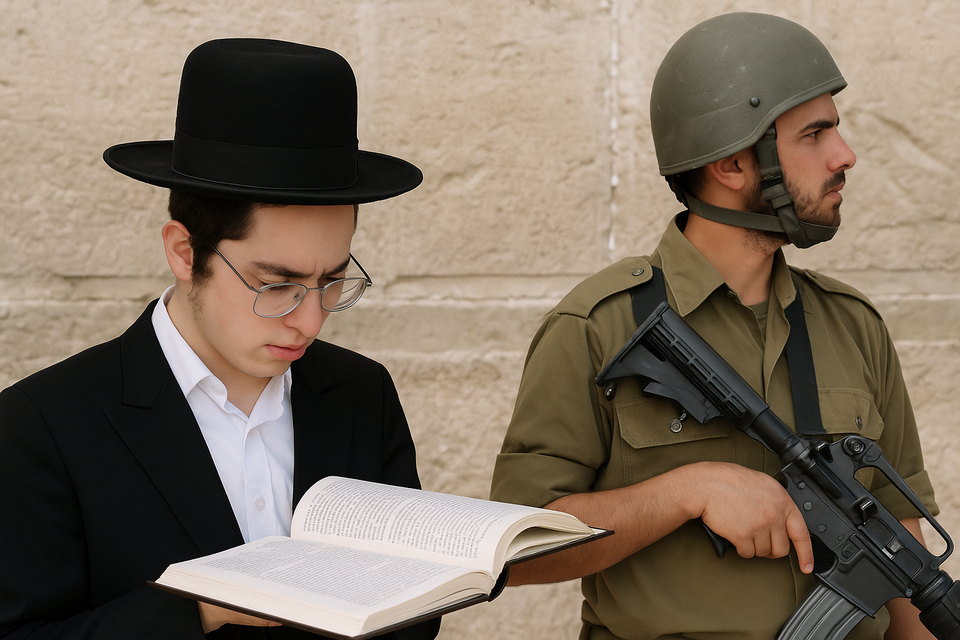But What About Charedim Who Can’t Learn Full-Time—Shouldn’t They Go to the Army?

This is one of the most commonly asked questions—even among sincere, frum Jews: “If the mitzvah of learning Torah full-time isn’t for everyone, and there are Charedim who aren’t learning seriously or at all, why shouldn’t they go to the army?”
It’s a fair question. But from the Charedi perspective, the answer remains firm: army service is not an appropriate environment for any Jew with yiras Shamayim, even if he is not currently learning full-time.
1. Yiras Shamayim is Not Optional
The Torah way of life doesn’t distinguish between "elite learners" and "average Jews" when it comes to avoiding spiritual danger. Every Jew is a ben melech. Every Jew must live according to Torah. If an environment is harmful to emunah, to shmiras mitzvos, or to kedushas Yisrael, then it is harmful for all—not just for bnei Torah.
The army is not a neutral setting. It’s a deeply secular institution. The tone, the culture, the exposure, the command structure—all of these are filled with dangers to one’s ruchniyus, regardless of where one is holding religiously.
This is why no Gadol, Litvish, Chassidish, or Sephardi, has ever said that army service is a lechatchilah for any religious Jew, even one who isn’t in yeshiva.
2. You Don’t Send Someone Spiritually Struggling into a Warzone
Let us speak plainly: many young Charedim who are not learning full-time are struggling. Some are weak in belief. Some in shmiras mitzvos. Some in identity. Sending a boy like that into an army base—where modesty is trampled, kfira is normalized, and mitzvos are impossible to keep—is not giving him a chance. It’s throwing him into a fire.
Would you send a child struggling with health into a minefield?
Why then would you send a spiritually fragile neshama into the ideological battlefield of the army?
3. The Army Demands Control—Not Conviction
In the IDF, soldiers are taught: “You don’t ask why. You just follow orders.” But a Jew doesn’t live like that. We don’t serve people. We serve Hashem. The idea that a frum soldier may be commanded to shave his beard, to enter mixed environments, to be forced into chilul Shabbos—all at the whim of secular superiors—is something that no G-d-fearing Jew can accept.
Even the Charedi youth who aren’t learning full-time are raised with a different value system. They may not be sitting with a Gemara, but they’ve been taught what it means to be a Yid. Sending them to an institution that mocks or erodes those values is not education—it’s destruction.
4. There Are Other Paths
When a Charedi bochur can’t learn full-time, the answer is not to throw him into the melting pot. The answer is to create frameworks that respect Torah values while helping him build a life of meaning and stability.
This is why many Gedolim have supported training programs (outside the army) that provide Charedi men with a parnassah while maintaining a Torah atmosphere. It's also why the Charedi world is working—slowly and carefully—to build healthy pathways for those who can’t or shouldn’t remain in yeshiva.
But it must be on our terms. Not theirs.
5. The Gedolim Have Spoken
Rav Aharon Leib Shteinman zt”l was once asked about boys who were not learning seriously: “Isn’t it better for them to go to the army, get structure, and maybe find a path?”
He answered sharply:
“The army is not a place of structure. It’s a place of hefkeirus. A weak boy will not become strong there—he’ll collapse completely.”¹
Rav Dovid Soloveitchik zt”l would say:
“If a boy is not learning, it is a tragedy. But sending him to the army is a second tragedy—and that one is avoidable.”²
Rav Nissim Karelitz zt”l ruled that even if a boy is not in yeshiva, he must not enlist. Instead, he must be helped, guided, and protected from spiritual damage.³
Rav Yitzchok Zilberstein shlita wrote:
“You do not throw a drowning man into deeper waters. You throw him a rope. Army service is not a rope—it’s a rock tied to his ankles.”⁴
6. A Story: The Bochur Who Nearly Drowned
There was once a bochur in Bnei Brak who struggled with yeshiva. He had a hard time learning and slowly dropped out. He began working odd jobs, disconnected from his chevra.
His parents—loving, but overwhelmed—agreed to let him join a Charedi army unit, thinking, “At least it’s structured. Maybe it will help him grow up.”
But after just two months, the boy returned home with no yarmulke, no tzitzis, and no respect for Torah. “They taught me,” he said bitterly, “that frumkeit is just a phase. I was too weak to answer back.”
It took years of love, therapy, and patience to slowly bring him back.
As one Gadol later said to the family: “The army is not a rehabilitation program. It’s a refuah that’s worse than the machalah.”
Conclusion
Not every Charedi boy will become a Rosh Yeshiva. But every Jewish soul is precious. And no Jewish soul belongs in a place that may destroy his connection to Torah, mitzvos, and Hashem.
When a boy struggles, we help him. We don’t hand him over to a system that may sever him from everything he once held dear.
The Charedi world’s refusal to send even its non-learning youth into the army is not about avoiding responsibility. It’s about embracing a higher responsibility—to protect the souls of our children, in every stage, on every level.
Footnotes & Sources
- Ohr HaShteinman, vol. 3, personal correspondence from Rav Aharon Leib.
- Mishnas Rav Dovid, p. 87.
- Psak reported in Kovetz Teshuvos by Rav Nissim Karelitz.
- Chashukei Chemed on Avodah Zarah, personal correspondence.
